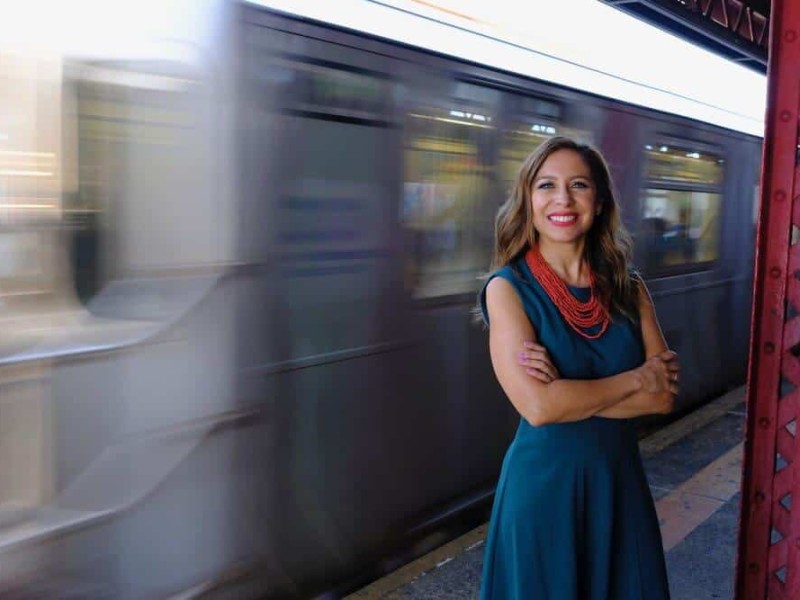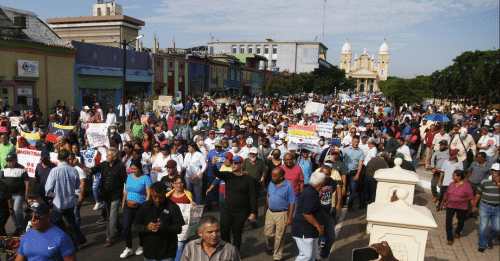Jessica González-Rojas Wants Systemic Change and is Aiming for the New York State Assembly

While Jessica González-Rojas’ dream was to work in the United Nations and become a diplomat, an early opportunity to work with Congresswoman Nydia Velázquez, the first Puerto Rican woman to serve in the U.S. Congress, rerouted her path. There, González-Rojas realized that she didn’t need to leave the U.S. to help people in need. Instead, she stayed home and ran for public office, becoming the first Latina to serve on the New York State Democractic Committee from 2002-2006.
“That was really a life changing moment because I saw the needs of our communities domestically,” said González-Rojas in a recent phone interview with the Luz Collective. “It wasn’t about ‘saving in the third world.’ It was about really looking at the needs [of our communities] locally.”
González-Rojas’ desire to help others showed up early. She received a good citizenship award in elementary school, and then as a teen was a candy striper at a local hospital. Her activism has since evolved into focusing on changing political systems and structures. “While I certainly want to help people and serve their needs, I’m looking more at the systemic conditions that we can change so that all our communities can thrive,” said González-Rojas. “[I want to see] that there’s less of a need for social services and more of a fair and just society that allows for all our communities to live out their dreams.”
González-Rojas’ is also motivated by her own family history. Her maternal grandmother struggled with poverty and disability from polio when she came to the mainland from Puerto Rico. Her father immigrated from Paraguay as a teenager and faced a language barrier that caused him to eventually drop out of high school and enter the workforce. “I think part of it is honoring their legacy and their intent around creating the American dream for my generation, me and my brother,” says González-Rojas. “I’ve always had a desire to make sure that the conditions for others behind us are much better.”
In the last fifteen years or so, González-Rojas has focused her efforts on one particular arena for social change: reproductive justice. An early experience at a Planned Parenthood clinic in the mid-90s is part of what has driven that focus. Heading towards the entrance of the clinic, then-college student González-Rojas was verbally and physically assaulted by protestors. “The protesters surrounded the front door,” says González-Rojas. “They yelled at me. They spit at me. They tried to grab my arm and said don’t do it.” She was there to get birth control. The experience left her believing that no one deserves to be treated that way for trying to access health care. Coincidentally, this occurred around the same time that National Latina Institute for Reproductive Health (NLIRH) was founded, where she later became the executive director in 2011.
“NLIRH is the only national reproductive justice organization dedicated to advancing health, dignity, and justice for the 29 million Latinas, their families, and communities in the United States,” according to their website. In 2016, the organization conducted a bilingual survey among Latino voters to learn their views on abortion access. What González-Rojas found interesting from the results was that while Latinos are typically assumed to be more conservative, they actually largely support abortion care. 89 percent of those surveyed stated that they would support a loved one who had an abortion. “So it’s less about should abortion be legal or illegal. That’s actually not the question to ask. The question is should somebody’s opinion on abortion impact another person’s ability to get one and the amount of support you would offer to those making those decisions,” says González-Rojas. “[The survey] showed us overwhelmingly that Latinos support their loved ones in making those decisions. Whether they agree with the decision or not, that’s an important value.”
González-Rojas stepped down from her position with NLIRH last month to run for New York State Assembly District 34, forcing Democrat Assemblyman Michael DenDekker to face election opponents for the first time in his six terms of office. González-Rojas is joined by criminal justice reformer Nuala O’Doherty-Naranjo in vying for the seat. González-Rojas says the incumbent, who is white, is not the right voice for a district that is predominantly people of color. “Their voices, their needs, their solutions are ones I want to make sure I take to the halls of Albany with the state’s legislature,” says González-Rojas.
González-Rojas decision to run may be part of a larger trend in NYC. Ross Barkan writes in a Gothamist article that several Democrats have filed to run for a public office hoping to follow in the footsteps of Alexandria Ocasio-Cortez. In her first run for office at just 29 she defeated 10-term incumbent Joe Crowley for U.S. House of Representatives in 2018. While having multiple challengers could benefit the incumbent in González-Rojas’ race, Matt Thomas, a member of the Democratic Socialist of America’s Queens electoral group, says that “The demographics of (DenDekker’s) district have changed remarkably. Even a split field is not necessarily going to be enough to preserve the incumbent.”
Make the Road Ahead (MRA) and New York Communities for Change (NYCC), two major grassroots organizations that build political power with marginalized communities in New York, both endorsed González-Rojas last month. “Jessica is the representative our community deserves and needs,” MRA member Aracelly Cantos, said in a press release published on González-Rojas’ campaign website. “She has fought for our community at the local and national level, and we know she will fight for us in the Assembly, especially when it comes to defending the rights and needs of immigrants and workers and tenants of color.” NYCC believes González-Rojas’ leadership experience with NLIRH and in the community makes her the right candidate to deliver their priorities–including a Green New Deal, fully funded schools and tuition-free college–to the New York’s capital.
“I am grateful to receive the NYCC’s powerful endorsement for our campaign. Our campaign is centered on building power for low-income people and people of color and NYCC will be an important partner in mobilizing our community,” González-Rojas said in a press release. “For too long, our immigrant community has been ignored and neglected. I’m running for State Assembly to be a leader for change and an advocate for immigrant justice.”




